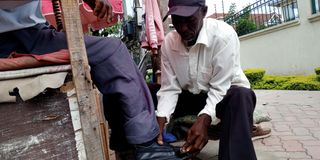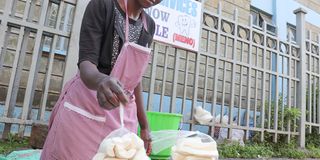Why local businesses struggled to turn a profit this year

Francis Kamau preparation a customers shoe shiner in Nakuru.
The small and medium enterprise (SME) sector in Nakuru remains a cornerstone of economic development and job creation.
However, the current economic challenges pose significant obstacles that require businesses, especially SMEs, to demonstrate resilience and adaptability.
High interest rates, rising taxes and fluctuations in disposable income have made the business environment particularly challenging for entrepreneurs. These factors have led to reduced consumer spending, forcing business owners to rethink their operations and strategies.
David Mbugua, a street chef, describes the financial difficulties he has faced this year. "People have become more cautious with their spending, which has forced me to reduce my daily stock. I couldn't afford to keep unsold goods overnight," he explains.
Mr Mbugua also cites the frequent demonstrations as a major disruption. "I couldn't open my shop on demonstration days. This affected my income and meant that my staff went without pay for those days," he says, noting that he lost up to Sh7,000 per day during such disruptions.
Despite these hardships, Mbugua remains hopeful and looks forward to better conditions next year.
Francis Kamau, a shoeshiner, expresses similar concerns about changing consumer habits. "People are bargaining more for services, which is affecting our earnings. Even loyal customers are trying to save and that's affecting my income," he explains.
Mr Kamau also points to the disruption caused by the demonstrations. "On demonstration days, I served only three customers compared to over 50 on normal days. Most of my clients work in offices, which remained closed during these times, and the tear gas made it impossible to operate," he adds.

Real Nyongesa displaying her cassava near Wakulima Market.
For vendors like Rael Nyongesa, the unpredictable weather poses additional challenges. Selling cassava on the street became increasingly difficult during the rainy season. "I had to hold my products in my hands while looking for customers in the rain," she says.
The erratic weather also affected her stock management. On some days, she had too much stock, while on others, she had too little in anticipation of rain.
Ms Nyongesa also faces pressure from county enforcement officers. "I have to use a large container to move quickly when officers are nearby to avoid being arrested," she says.
Despite the many challenges, these entrepreneurs remain optimistic about the future. Their resilience and determination, even in the face of adversity, highlight the vital role that SMEs play in driving local economies.
As the new year approaches, Nakuru's business community is hoping for more stable economic conditions and renewed opportunities for growth.


